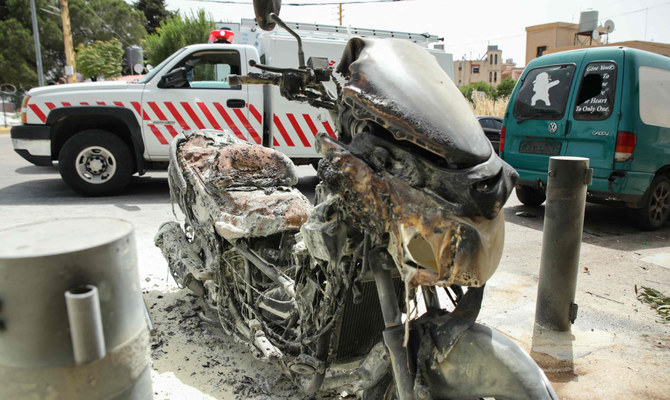BEIRUT: An Israeli strike on Monday outside a hospital in south Lebanon killed one person, the latest deadly raid in the country’s south.
Victim, Ali Wizani, on a motorcycle at the hospital entrance, was heading for medical tests.
Fifteen other people sustained varying injuries, including seven civilians and eight health care workers at Salah Ghandour Hospital in the city of Bint Jbeil.
The hospital security guard, Hassan Jouni, underwent surgery due to severe injuries.
An Israeli combat drone carried out Monday’s attack during a peak time when patients were arriving at the hospital at the start of the week.
For the first time since the hostilities began in the southern Lebanon border area, the Israeli army targeted the vicinity of a hospital on Monday morning.
The Israeli military has increased its efforts in recent days to apprehend individuals using cars or motorcycles on the roads, resulting in the fatalities of Hezbollah members and civilians.
The Lebanese Ministry of Health condemned the brutal Israeli shelling that targeted the hospital.
The hospital “is the only one still operating in this area from which residents have been displaced due to Israeli attacks,“ its director, Dr. Mohammed Sleiman, told Arab News.
“When the drone carried out its attack on the hospital entrance, there were people gathered to enter, which caused injuries.”
He said: “The hospital staff quickly evacuated the patients from the damaged front floors.
“We found that the shells used contained nails or iron fragments that left traces in the hospital building.
“The hospital’s role is humanitarian. The Israelis know the hospital very well, and we follow all required instructions during wars.”
Dr. Sleiman added: “In the July 2006 war, the hospital was subjected to direct shelling, and after today’s attack, we resumed work normally.
“We receive all patients in addition to the wounded from Israeli attacks. We currently have 17 patients besides the war-wounded.
“We receive non-urgent surgeries, and we have a medical team residing in the hospital since the attacks began.
Ambulances operate normally, and the medical staff comes to the hospital as usual. After the attack, doctors and nursing staff who were off-duty came to the hospital to help.
“We do not suffer from any shortages of medicines and equipment, as the Ministry of Health supplies us with what we need.”
The Health Ministry described the hospital attack as a “full-fledged war crime and a new episode in the series of repeated and flagrant violations committed by Israel against health care facilities and health care workers in Lebanon, violating all human rights laws, the Geneva conventions, and all international laws and norms that stipulate the protection and respect of health care workers and the provision of safety for them during armed conflicts.”
Hezbollah retaliated against the Israeli assault on the hospital by “targeting and destroying the newly installed spy equipment at the Miskaf Am site.”
Media outlets in Israel reported that “firefighting crews are working to extinguish a massive fire that broke out in the settlement of Kiryat Shmona after rockets were launched from Lebanon.”
Hezbollah targeted “a building used by enemy soldiers in the Margaliot settlement with appropriate weapons and achieved confirmed casualties.”
The group also “launched an intense fire attack on the Al-Malikiyah position with guided missiles and artillery shells, targeting its garrison, its equipment, and the positions of its soldiers.”
Hezbollah used “attack drones on targets inside the site and hit them accurately” in its retaliation.
The Israeli army said that “a Sky Rider drone fell inside Lebanese territory, and the incident is being investigated.”
The Israeli military said that it bombed a building where Hezbollah members were located in the Yaron border area on Sunday.
Additionally, the air force targeted Hezbollah members in Hula, hitting a weapons storage facility in Mays Al-Jabal and military infrastructure in Khiam.
The Israeli raid on the town of Yaron led to casualties.
The border villages have not been spared from continuous Israeli bombardment, which it is said, aims to destroy homes and properties and burn crops with internationally prohibited phosphorus bombs.
An Israeli army spokesman said, “The Israeli forces have increased their readiness for the war on Lebanon. Over the past weeks, the 146th Division and the 205th Reserve Armored Brigade conducted an exercise at the division and brigade level simulating ground maneuvers in Lebanon.”
The spokesperson said “the exercise simulated combat scenarios on the northern front, the rapid deployment of forces in the field, the role of division and brigade command centers, and the readiness of forces for attack.”
Also on Monday, caretaker Prime Minister Najib Mikati discussed the security situation in the south with Gen. Aroldo Lazaro, the commander of UNIFIL Forces.
The talks included preparations to submit the periodic report to the UN Security Council about the implementation of Resolution 1701 and the coordination between UNIFIL and the Lebanese Army.














